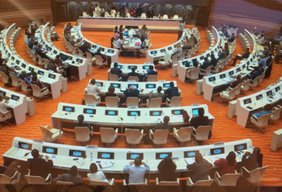Professor Hildebrand, Managing Partner EE&MC, participated July 10-12, 2019 in the UNCTAD group of experts meeting on regulation in the digital economy in Geneva, Switzerland. The purpose of the United Nations Conference on Trade and Development (UNCTAD) is to ensure that partner countries benefit from open markets, intense competition, private sector investment and improved consumer welfare.
The experts discussed a background document entitled “Competition issues in the digital economy” that was prepared by the secretariat. https://unctad.org/meetings/en/SessionalDocuments/ciclpd54_en.pdf
Big technology companies penetrate all spheres of our lives from shopping to social interaction. Apple, Alphabet (Google), Amazon and Facebook replaced big oil and gas, and telecommunications firms in the top ten global companies based on market capitalization by 2018.
Developments in technology and innovation make everything just “a click away”. Despite their benefits, digital platforms have gained great control over consumers’ data, which have conferred them market power. This has raised not only competition but also consumer protection and privacy concerns. Many countries have been looking into these platforms’ market power and looking for ways to deal with the challenges arising therefrom.
The UNCTAD background note to the IGE meeting focused on the features specific to digital platforms and their implications for competition law and policy. It identified areas, where there is need for adapting competition laws or tools to deal with the challenges arising from dominant digital platforms. The experts discussed some policy options for protecting and promoting competition in the digital economy. The experts discussed i.a. the following questions:
- What are the features specific to digital platform and their business models? What makes them different from offline businesses?
- Are there existing competition laws and competition tools adequate to address the competition concerns, related to abuse of market power and merger control, arising from dominant online platforms?
- Do competition authorities need to change their approach to competition law analysis and enforcement?
- Should online platforms be regulated to ensure their neutrality as well as open and fair access for all businesses, and to provide for a level playing field?
- What are competition law enforcement challenges faced by and experiences of developing countries’ competition authorities?
Beyond this round table, other key issues were addressed at the meeting, such as the work carried out by the discussion group on international cooperation. Also competition issues in the health sector, specifically looking into pharmaceuticals and health care services were addressed.
For additional information about the conference visit the conference website at:
https://unctad.org/en/Pages/MeetingDetails.aspx?meetingid=1895

